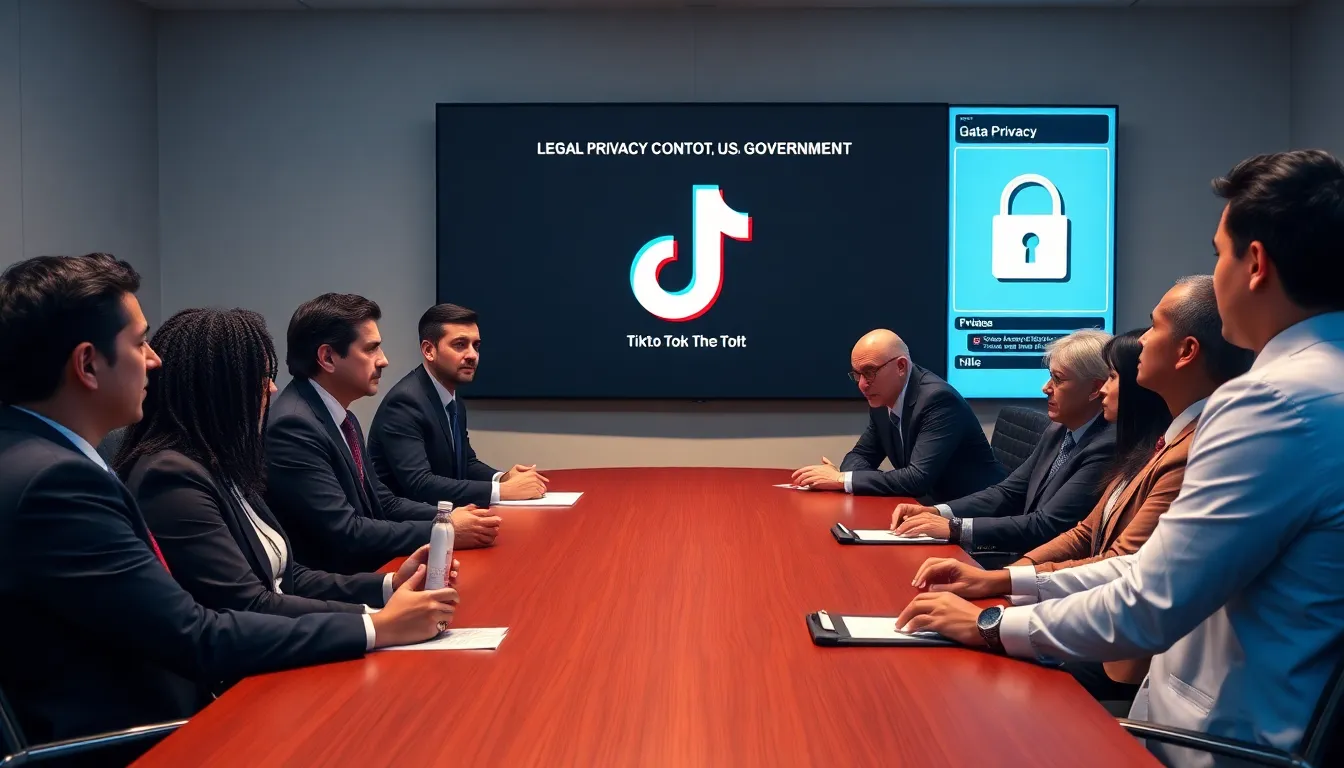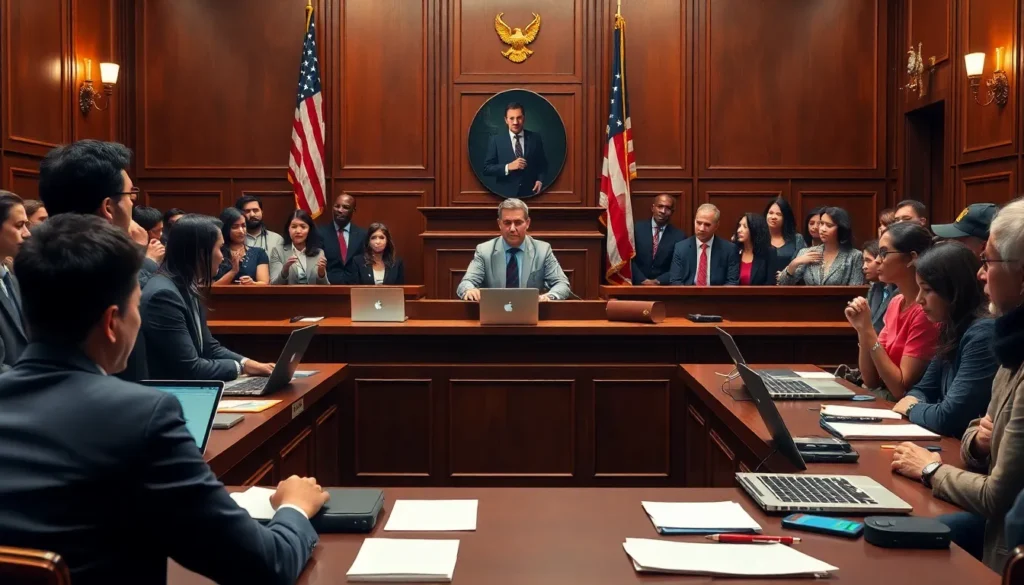Table of Contents
ToggleIn recent years, TikTok has become a cultural phenomenon, captivating millions with its short-form videos and creative content. However, this popularity has sparked significant legal challenges, particularly from the U.S. government. As concerns about data privacy and national security mount, the platform finds itself at the center of a heated legal battle that could reshape its future in America.
The conflict revolves around allegations that TikTok poses risks due to its Chinese ownership. As lawmakers push for stricter regulations, the stakes have never been higher for the app and its users. This ongoing legal saga not only highlights the complexities of tech regulation but also raises important questions about user rights and the balance between innovation and security in the digital age.
Overview of the TikTok Legal Battle
TikTok faces multiple legal challenges instigated by the U.S. government, primarily focusing on national security and data privacy concerns. The app, owned by the Chinese company ByteDance, draws scrutiny due to fears that user data could be accessed by the Chinese government. Legal actions began in 2020, when former President Donald Trump sought to ban TikTok unless it was sold to a U.S. company.
Lawsuits from TikTok contest claims asserting substantial risks to national security. Federal courts have intervened by blocking attempted bans, citing procedural issues and the lack of concrete evidence of wrongdoing by the company. As of October 2023, the case continues to evolve with varying rulings from different courts.
Congress plays a pivotal role in this legal landscape. Recently proposed legislation aims to establish comprehensive regulations for foreign-owned apps to improve data protection and transparency. Discussions oscillate between fostering innovation and safeguarding user rights, reflecting broader dilemmas in tech regulation.
Stakeholders, including lawmakers, tech industry leaders, and civil liberties advocates, weigh in on the legal merits and implications. The situation remains fluid, showcasing the growing complexities inherent in governing rapidly evolving digital platforms.
Key Players Involved

The TikTok legal battle involves significant stakeholders from diverse sectors, notably TikTok and the U.S. government. Each entity plays a crucial role in the ongoing discussions surrounding data privacy and national security.
TikTok and Its Parent Company
TikTok, owned by the Chinese firm ByteDance, serves as a primary focus in this legal dispute. The app boasts over 1 billion monthly active users globally, with a significant portion based in the U.S. ByteDance asserts that it prioritizes user privacy and complies with local laws. In response to accusations regarding data access by the Chinese government, TikTok continuously emphasizes its independent operations and data encryption methods. Legal challenges from the U.S. government prompt TikTok to mount defenses against claims of security risks, showcasing its commitment to user safety.
The US Government
The U.S. government represents a key player in the legal conflict, aiming to address concerns over data privacy and national security. Multiple federal agencies, including the Committee on Foreign Investment in the United States (CFIUS), investigate potential risks associated with TikTok’s Chinese ownership. Legislative actions initiated by Congress in recent years highlight the urgency to implement robust regulations for foreign-owned technology platforms. The government’s stance reflects a broader strategy to safeguard American citizens’ data while balancing innovation in the tech sector.
Major Legal Issues at Stake
TikTok’s ongoing legal battle with the U.S. government centers on significant issues regarding data privacy and national security. These concerns drive regulatory actions and shape the discourse on technology governance.
Data Privacy Concerns
Data privacy remains a central focus in the legal disputes involving TikTok. U.S. officials voice apprehensions that TikTok, through its Chinese parent company ByteDance, could mishandle user data or share it with the Chinese government. Such fears stem from the lack of transparency regarding data handling practices and the potential for foreign access. Legislative proposals aim to strengthen data protection measures and enhance user consent, emphasizing the necessity for apps to disclose data usage and storage practices.
National Security Implications
National security implications frame the context of TikTok’s legal challenges. Government agencies contend that TikTok poses risks associated with foreign influence, particularly concerning user data and misinformation campaigns. These assertions have prompted investigations by the Committee on Foreign Investment in the United States (CFIUS) to evaluate threats to national interests. The discourse invites scrutiny about balancing national security with digital innovation, necessitating comprehensive regulatory frameworks that address these complex challenges.
Recent Developments in the Case
Recent developments in the TikTok legal battle show fluidity in judicial rulings and legislative initiatives addressing concerns over national security and data privacy.
Court Rulings and Outcomes
Court rulings have highlighted the complexity of TikTok’s legal challenges. Various federal courts have blocked attempts to ban the app, citing procedural flaws and insufficient evidence of harm. In August 2023, a court rejected the government’s request for a preliminary injunction against TikTok, emphasizing First Amendment protections. Additionally, separate cases continue in circuit courts, where judges assess the legality of potential restrictions based on national security assessments. Rulings vary across jurisdictions, contributing to an inconsistent legal environment for TikTok and reflecting broader challenges in tech regulation.
Legislative Actions
Legislative actions are responsive to the ongoing legal disputes surrounding TikTok. In September 2023, Congress proposed the “Foreign Tech Transparency Act,” aiming to enforce stricter data privacy protocols for foreign-owned applications. This bill includes requirements for user consent and mandatory reporting on data access and sharing. Further discussions emphasize a potential framework for cooperation with international bodies to establish unified data protection standards. As lawmakers navigate political divides, the implications of these legislative actions may significantly impact TikTok’s operations and the future of foreign-owned tech companies in the U.S.
Impact on TikTok’s Future in the US
As TikTok navigates its legal battles in the U.S., the outcome significantly influences its operational strategies, user community, and overall market presence.
Business Operations and Compliance
TikTok’s business operations face increased scrutiny due to regulatory challenges from U.S. lawmakers. Compliance with proposed legislation, such as the “Foreign Tech Transparency Act,” necessitates implementing enhanced data privacy protocols. TikTok must ensure user consent for data access and sharing while adapting to evolving legal requirements, impacting its operational frameworks. Failure to meet compliance standards could result in fines or restrictions on its business activities within the U.S. Additionally, maintaining transparency with federal agencies like the Committee on Foreign Investment in the United States (CFIUS) remains crucial to mitigating perceived national security threats. As these regulations evolve, TikTok may explore partnerships with U.S. companies to bolster its compliance efforts and reassure users regarding data privacy.
User Base and Community Reaction
TikTok’s user base, composed of over 1 billion monthly active users, actively monitors the app’s legal situation and its implications for privacy and security. Users express concerns about potential data misuse and the impact of government regulations on their content freedom. Community reaction varies, with some advocating for stronger data protections while others emphasize the app’s role in fostering creativity and connection. Increased awareness around data privacy issues could influence user trust and engagement. Social media campaigns that promote user voices on privacy concerns may emerge as a response to legislative developments. As TikTok navigates its legal challenges, maintaining user support becomes essential for preserving its vibrant user community and mitigating the impact of legal uncertainties on its platform.
The ongoing legal battle between TikTok and the U.S. government highlights the intricate balance between national security and digital innovation. As the app faces scrutiny over data privacy concerns, its future hinges on evolving judicial rulings and legislative measures. The proposed “Foreign Tech Transparency Act” signals a shift towards stricter regulations for foreign-owned platforms, reflecting broader societal concerns about user data protection.
TikTok’s ability to adapt to these changes will be crucial in maintaining user trust and ensuring compliance with new laws. As stakeholders continue to engage in discussions about the app’s implications, the outcome of this legal saga will undoubtedly shape the landscape for tech companies operating in the U.S.







